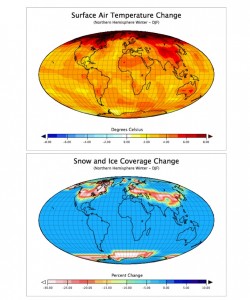By Stephanie Lepage
General Science subject editor
Sunday marks the release of the Summary for Policymakers of the Fifth Assessment Report (AR5), written by the Intergovernmental Panel on Climate Change (IPCC). The IPCC is an international panel of scientists, backed by the UN and charged with assessing the current state of climate change and climate science. With the release of the synthesis report upon us, it’s just a matter of time before so-called “climate change deniers” come out of the woodwork. I’m not just talking about people who attack the validity of the report, but individuals who question the reality of human-caused climate change altogether.

Maps of the changes in a) temperature and b) snow and ice coverage predicted for the year 2100 using the EdGCM software running the most extreme IPCC scenario, A1F1 from a “control simulation”. (Image from SERC Carleton)
Deniers rely on many different – often conflicting – arguments to support their claims that climate change is not occurring, and/or that humans are not the main culprits driving these changes. A comprehensive list of commonly used arguments, and the scientific evidence debunking these myths, is available at Skeptical Science. This scientifically unsupported “uncertainty” over climate change is championed not only by private citizens, but often by public officials and policymakers. As such, it has a major effect on public perception and is responsible, at least in part, for the inactivity of governments in instituting policies that may reverse climate change trends. For more on the tension between science and policy, read “IPCC reports: between the street and the policy-makers” featured this week in the Science Borealis blog.
Sound science is predicated on skepticism, but healthy skepticism sometimes crosses a blurry line and enters the realm of denialism. What exactly pushes some people across that line, allowing them to deny the existence of climate change in the face of such a well-supported body of scientific evidence?
Political or commercial agendas are obvious motivations for lobby groups (e.g., the fossil fuel lobby) to deny the realities of climate change, but what about the average person? Interestingly, a paper published in Psychological Science reported that individuals who believed in other conspiracy theories were more likely to be climate change deniers. But, not all deniers are lobbyists or conspiracy theorists. Read about the journey of a scientist – fellow Science Borealis editor and blogger Kasra Hassani – from climate change denier to believer in his post “Confessions of a Former Climate Change Denialist” on the Canadian Science Writers’ Association blog. Ultimately, it comes down to the fact that humans are not entirely rational beings who base their decisions solely on sound science – our values play a large role in determining our response to key issues such as climate change. Some argue that the way to reach climate change deniers is through values-based, rather than science-based, arguments – and they seem to have a point.
There will always be deniers among us. However, perhaps a better understanding of the varied motivations/reasons underlying climate change denial will help scientists shift public perception, bringing climate change issues to the forefront of everyone’s mind.



